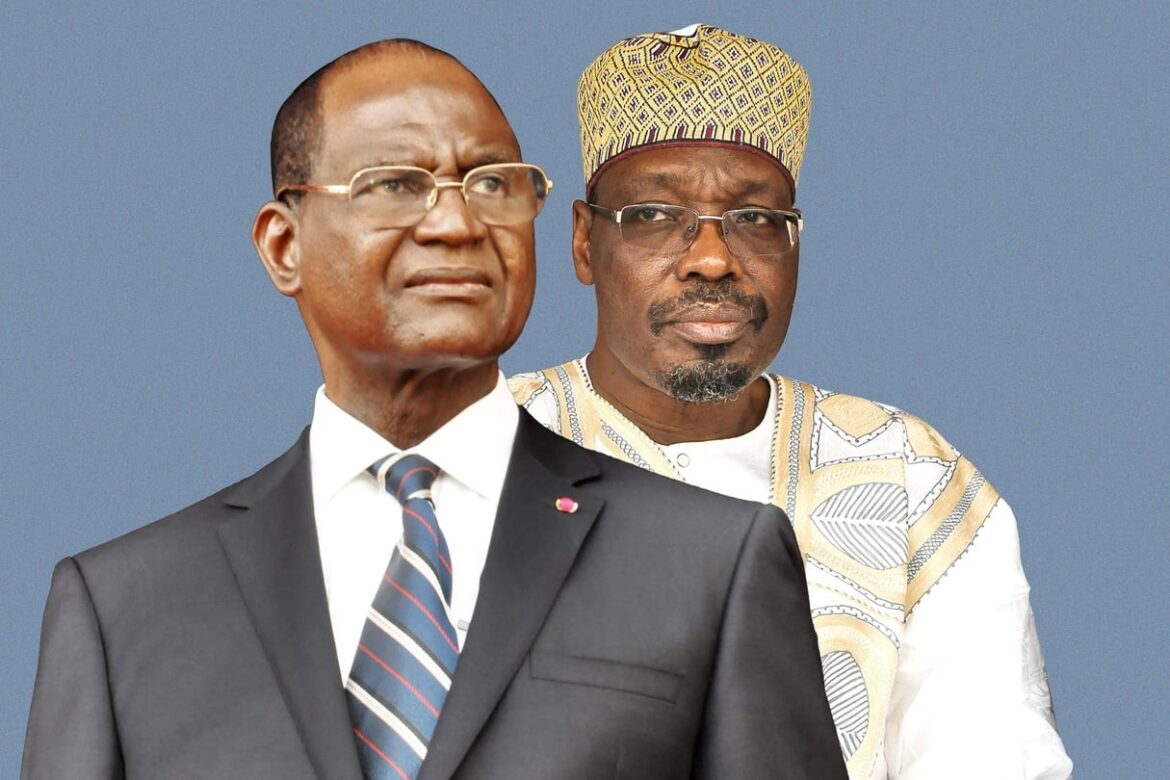By Franklin Sone Bayen
The campaign of NUDP leader, Bello Bouba Maigari on 14 September rejected the declaration on 13 September that his northern rival, Issa Tchiroma, has been chosen as the opposition consensual candidate, mainly by Ekane Anicet and Djeukam Tchameni. That came as little surprise to anyone who has been following Cameroon’s contemporary political history. The two men distrust each other and had fallen out acrimoniously in 1992.
Below is a fact sheet timeline of the Bello/Tchiroma saga. Let’s take it from 1982:
– When Paul Biya succeeded Ahmadou Ahidjo as second president of Cameroon in November 1982, he appointed Bello Bouba Maigari as his Prime Minister. Bello was 35 years old. He had earlier held a couple of government positions including that of Minister of the Economy. It looked then like Bello was in line to be the third president. Under the constitutional provision at the time whereby the PM was the constitutional successor, Bello was in a position to succeed President Biya if the latter died in office or decided to quit power as his predecessor had done in his favour. It was said that Ahidjo recommended (or imposed Bello on) to Biya to maintain the north-south power balance.
– Less than a year into office, Bello left (or fled) into exile, abandoning or having resigned as PM, following accusations that he was involved in the first coup plot that was uncovered in August 1983 (before the bloody one of April 1984). He relocated to Kano in Nigeria. Little-known Issa Tchiroma then, a railway engineer, was a senior official at the railways company (Regifercam). In 1984, he had been arrested in connection with the failed bloody coup attempt of April 6, 1984. He was tried and found to be innocent, spared execution like many others but still held in detention at the Yoko prison.
– Fast forward to 1991. With the official relaunch of multiparty politics following the December 1990 Liberty Laws, NUDP (National Union for Democracy and Progress) was created with essentially a northern base and former Ahidjo regime men as its leaders. Samuel Eboua, former Secretary General at the Presidency under Ahidjo was its founding President. Though Bello was still in exile, it was widely reported that he would be the Presidential Candidate for NUDP. Hamadou Moustapha who was also a young minister under Ahidjo, was a Vice President and Issa Tchiroma, released from jail under the Amnesty Laws that also rehabilitated the image of those who, like Um Nyobe, Ahidjo etc, were considered political outlaws, became Political Secretary of the nascent NUDP.
– Ahead of the Tripartite Conference that took place in Yaounde in October-November 1991 to bring the CPDM government, the opposition and civil society actors to talk around the table, Bello returned from exile and within weeks, pulled his weight within NUDP and convened an extraordinary congress of the party in Garoua which Samuel Eboua boycotted in protest and where Bello emerged as new President of the party.
– In March 1992, NUDP emerged second with 68 seats behind CPDM’s 88 in the parliamentary (legislative) elections of March 1992 boycotted by SDF and CDU. Bello, Tchiroma and Moustapha were among NUDP parliamentarians. Later that year, Biya appointed Tchiroma and Moustapha into his government. It was reported that the two NUDP men accepted the appointment without the knowledge of Bello, their party leader. Tchiroma was minister of Transport. Moustapha returned to the Housing and Town Planning ministry he had held under Ahidjo.
– When in a 1994 cabinet reshuffle Tchiroma.and Moustapha were maintained in government against Bello’s wish that they be sacked, he said they had thus excluded themselves from NUDP. Furious, Tchiroma was seen on TV threatening that they would “teach Bello a lesson!” He and Moustapha declared they had taken over as leaders of what they called “Authentic” NUDP but later registered a new party, National Alliance for Democracy and Progress (ANDP) in 1995. Both men were eventually dropped from the government in 1996.
– In 1997, Bello was appointed into government as Minister of State for Post and Telecommunications.
– In 2002, Tchiroma returned to NUDP. Unknown whether he was mandated by the party, but obviously unlikely, he played a key role in the quest for an opposition consensual candidate for the 2004 presidential election, which picked the late Adamou Ndam Njoya. NUDP was not officially part of the process.
– In 2007, Tchiroma founded the National Front for the Salvation of Cameroon or FSNC in its French abbreviation.
– In 2008, Tchiroma supported the CPDM’s modification of the Constitution, removing the two-term limit in force since 1996, which would have barred President Biya from seeking re-election at the end of his second mandate under that law in 2011.
– In 2009, Tchiroma was appointed back into the government as Minister of Communication.
– Fast forward to this year. in June, both men resigned from the government. Tchiroma first. Followed by Bello. They both declared their candidacy for the 12 October presidential election. Both men have been pulling big rally crowds in their northern home base. Both men are evidently energizing their base. They are both from Garoua. Opinion polls by English Cameroon for a United Cameroon led by Dr Benjamin Akih, have been suggesting that Tchiroma has a wide lead over all other candidates including Bello.
– About two weeks ago, Bello paid an under-reported courtesy call on Tchiroma at his Garoua home. Little filtered out of the meeting but a video circulating on social media on the same day Tchiroma was presented as consensual opposition candidate, shows both men smiling, shaking hands and later embraced as Bello stepped out of his car and Tchiroma walked out of his house to his veranda.
– The turn-out numbers and anti-Biya energy in the northern regions around the candidacy of Bello and Tchiroma, not seen in previous elections and which gave the impression that Biya owned the massive northern votes, has triggered calls for unity between Bello and Tchiroma to ensure the northern votes are not split. Though both men have visited and held talks with disqualified candidate, Maurice Kamto in an effort towards what many describe as the ideal electoral coalition (KBTM adding Akere Muna), persistent signs of distrust between Bello and Tchiroma are unsettling opposition enthusiasts who hope for a unified opposition front, which many believe would be the surest way to oust incumbent Biya.
*The author has covered politics for over about three decades in Cameroon and abroad, beginning as a secondary school boy. He took Political Science, Sociology and Anthropology courses among his composite minors during his undergraduate and post-graduation Journalism and other studies at ASMAC-ESSTIC, UB and UPAC. He can be reached at: sonebayen@gmail.com, 674749575 (direct calls), 656969090 (WhatsApp), @sonebayen (X, former Twitter)

